新编大学英语第三册课文翻译
新编大学英语3课文翻译完整版

第一单元 羞怯的痛苦1 对许多人来说 羞怯是很多不愉快的起因。
各种各样的人——矮的、高的、愚笨的、聪明的、年轻的、年老的、瘦的、胖的——都说自己是羞怯的。
羞怯的人会焦虑不安 感到不自然 也就是说 他们显而易见地关注自己的外表和举止。
脑海中不断地盘旋着一些使自己不安的想法: 我给人留下的是什么印象 他们喜欢我吗 我讲话是不是傻里傻气 我长得难看。
我穿的衣服毫不引人注目。
2 很显然这种不安的感觉会对人们产生不利的影响。
一个人的自我看法反映在自己的行为方式之中 而一个人的行为方式又影响他人的反应。
通常 人们如何看待自己对他们生活的各个方面都会产生深刻的影响。
例如 具有积极的自我价值观或很强的自尊心的人往往表现自信。
由于自信 他们不需要他人不断地称赞和鼓励使自己感觉良好。
自信者热情地自发地投身生活。
他们不因别人认为他们“该”做什么而受到影响。
有很强自尊心的人不会被批评所伤害 他们不会把批评看作是人身攻击。
相反 他们认为批评是一种要他们改进的建议。
3 相比之下 羞怯的人自尊心较弱 往往消极被动并且容易受他人影响。
他们(是否)在做“该做的事情”需要得到别人的肯定。
害羞的人对批评非常敏感 他们觉得批评却好证实了他们比别人差。
他们也很难因别人的赞美而高兴 因为他们相信自己不值得称赞。
羞怯的人也许会用这样的话来回答别人的赞美之辞 “你这么说只是为了让我感觉好一些。
我知道这不是真的。
”显然 尽管自我意识是一种健康的品质 过分的自我意识却是不利的、有害的。
4 能否彻底消除或者至少减轻羞怯感呢 幸运的是 人们能够通过坚持不懈的努力建立自信从而克服羞怯。
由于胆怯和缺少自尊是密切相关的 因此正视自己的优点还有弱点非常重要。
例如 大多数人希望每门功课都得A。
如果仅仅因为在某些领域有困难 就把自己列为差生 这不恰如其分。
人们对自己的期望必须与现实相符。
老是想那些不可能的事情会觉得自己能力差 甚至产生嫉妒。
当我们嫉妒比自己成绩好的学生时 我们正在自我毁灭。
新编大学英语第三册课文原文及翻译
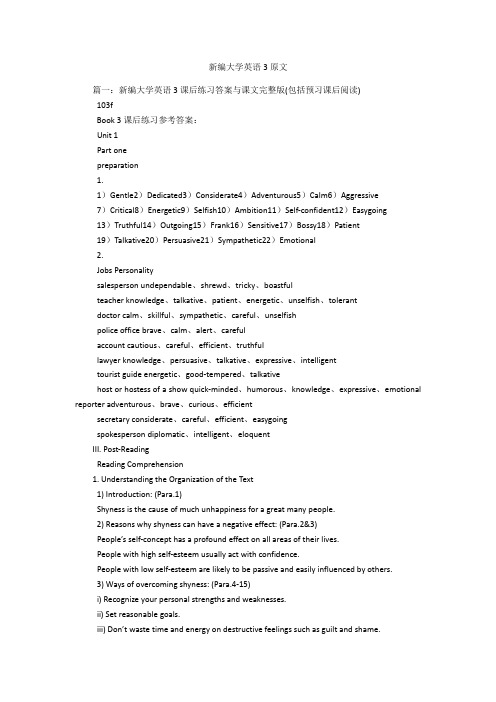
新编大学英语3原文篇一:新编大学英语3课后练习答案与课文完整版(包括预习课后阅读)103fBook 3课后练习参考答案:Unit 1Part onepreparation1.1)Gentle2)Dedicated3)Considerate4)Adventurous5)Calm6)Aggressive7)Critical8)Energetic9)Selfish10)Ambition11)Self-confident12)Easygoing13)Truthful14)Outgoing15)Frank16)Sensitive17)Bossy18)Patient19)Talkative20)Persuasive21)Sympathetic22)Emotional2.Jobs Personalitysalesperson undependable、shrewd、tricky、boastfulteacher knowledge、talkative、patient、energetic、unselfish、tolerantdoctor calm、skillful、sympathetic、careful、unselfishpolice office brave、calm、alert、carefulaccount cautious、careful、efficient、truthfullawyer knowledge、persuasive、talkative、expressive、intelligenttourist guide energetic、good-tempered、talkativehost or hostess of a show quick-minded、humorous、knowledge、expressive、emotional reporter adventurous、brave、curious、efficientsecretary considerate、careful、efficient、easygoingspokesperson diplomatic、intelligent、eloquentIII. Post-ReadingReading Comprehension1. Understanding the Organization of the Text1) Introduction: (Para.1)Shyness is the cause of much unhappiness for a great many people.2) Reasons why shyness can have a negative effect: (Para.2&3)People’s self-concept has a profound effect on all areas of their lives.People with high self-esteem usually act with confidence.People with low self-esteem are likely to be passive and easily influenced by others.3) Ways of overcoming shyness: (Para.4-15)i) Recognize your personal strengths and weaknesses.ii) Set reasonable goals.iii) Don’t waste time and energy on destructive feelings such as guilt and shame.iv) Don’t be afraid to speak up and give your point of view.v) Do not make negative comments about yourself.vi) Accept criticism thoughtfully.vii) Profit from failures and disappointments by viewing them as learning experiences.viii) Do not associate with people who make you feel inadequate.ix) Set aside time to relax, enjoy hobbies, and reevaluate your goals regularly.x) Practice being in social situations.4) Conclusion: (Para.16)The better we understand ourselves, the easier it becomes to live up to our full potential.2. Understanding Specific Information1) F2) F3) T4) T5) T6) F7) T8) F9) F10) T3. Group Discussion1) I think the most effective ways of overcoming shyness are the first and seventh ways. Recognizing our personal strengths and weaknesses is useful because if we know ourselves better, we can feel more self-confident. We can be more objective, instead of being blind. The seventh way is to profit from failures and disappointments as learning experiences. If we allow ourselves to get discouraged and sad when we fail, then we will feel more unsure of ourselves. But if we think of a failure as a learning experience, we are adopting a positive attitude. By analyzing objectively why we failed and planning how to set about doing things differently we will be more likely to succeed next time.2) Modesty is used to describe a reserved appraisal of one’s merits, abilities or success, e.g. she is very modest about her accomplishments. Shyness is used to describe the uncomfortable feeling one has in the company of others. It often implies a lack of self-confidence and a timid, reserved manner. Modesty is a good personality trait while shyness in many cases is undesirable.3) Yes, it is appropriate and normal to be shy in some circumstances: in the presence of teachers, your boss, your parents’ friends or your prospective in-laws; when you are dating someone, especially the first time; when you are with strangers; when you are in a new environment; when you’re facing a large audience.Vocabulary1. Self- is a prefix which means ―of, to or by oneself or itself.‖Words with the prefix self- that appear in the text: self-conscious, self-concept, self-assurance, self-worth, self-confidence, self-esteem, self-destructive, self-awareness, self-accept103fance, self-rejection, self-confident1) self-conscious (worried and embarrassed about what you look like or what other people think of you)2) self-confidence (belief in one’s own ability, power, judgment, etc.; confidence in oneself)3) self-esteem (the feeling that you are someone who deserves to be liked, respected, or4) self-destructive (with thoughts or actions that are counter to one’s own best interests)5) self-worth (the value you give to your life and achievements)6) self-concept (one’s conception or general idea of one’s own basic character and nature)7) self-awareness (realistic knowledge and judgment about oneself)8) self-assurance/self-confidence (the belief that you are able to deal with people and problems easily)2. Part A1) B2) I3) L 4) A5) H6) D7) E8) N9) J10) M11) C12) F13) G14) KPart B1) profound2) jealousy 3) numerous 4) overweight5) overcome6) eventually7) slim 8) compliments 9) diminish10) reassurance 11) detrimental12) isolated13) self-esteem14) accented3. 1) reflected 2) concerned/worried 3) profound effect 4) viewed/regarded 5) sensitive6) respond/react 7) eliminated 8) overcome my fear 9) concentrate on 10) made no commentTranslation1.You should spend a reasonable amount of time relaxing and exercising.2. In general children are healthier and better educated than ever before.3. When the right opportunity comes along, he’ll take it.4. Every day he sets some time aside to be with his family and enjoy life.5. I remember those dark streets and walking hand in hand with my father.6. He finally failed to live up to his parents’ expectations.7. In contrast, our use of oil has increased enormously.8. He succeeded in his efforts to overcome his fatal weakness.Part ThreeFURTHER Development1. 1)BBABC6)CBCAA11)CBPart FourWriting and Translation (P46)2. Translation Practice1) It is believed that pessimism often leads to hopelessness, sickness and failure.2) Optimism, by contrast, can make you happy, healthy and successful.3) When you fail in something, profit from the failure as a learning experience.4) Think about your strengths and build up self-confidence in front of problems or difficulties.5) Don’t let negative thoughts hold you back.6) Everyone has experienced failures and disappointments, so don’t blame yourself too muchPart onepreparation4.matching pictures1)Aphrodite2)Ares3)Hephaestus4)Artemis5)Demeter6)Dionysus7)Poseidon8)Athena9)Apollo10)Hermes11)Hera12)ZeusPost-ReadingReading Comprehension1. 1) Because they were invited to a feast in the sky.2) He saw the birds were busy preparing.3) He planned to go to the feast/sky with the birds.4) They didn’t agree because Tortoise was mischievous/cunning and ungrateful.5) With a sweet tongue, he convinced the birds that he was a changed man.6) He made two wings with all the feathers he got from each bird.7) All of you.8) Nuts, meat and fish soup, pounded yam, yam soup, palm wine, etc.9) For whom have you prepared this feast?10) Because he knew the answer would be ―For all of you‖, which was his new name. So he could enjoy all the food first.11) They were very angry.12) They took back the feathers they had lent him.13) He asked them to take a message to his wife.14) Parrot, because he wanted to take advantage of the chance to get revenge.15) He asked Parrot to tell his wife to bring out all the soft things in his house to cover the ground with them so that he would be able to land safely. But Parrot told his wife to bring out all the hard and sharp, not the soft, things instead.16) His shell was broken into hundreds of pieces.2. Ekwefi is telling a story about Tortoise. Long long ago, there was a famine, and the birds got an invitation from the sky to attend a feast there. Tortoise learned about it and with his sweet tongue he persuaded the birds to take him with them and so each bird lent him a feather.103fTortoise cunningly thought of an idea that enabled him to have all the food by naming himself ―All of you.‖ When they reached the sky, they received a warm welcome and soon the food was presen ted to them. Then he asked one of the people in the sky: ―For whom have you prepared all this feast?‖ The man replied: ―For all of you.‖ So he ate almost all the best food. The birds became very angry and took back their feathers before flying home. Without feathers, he had to jump onto the ground and his shell was broken into pieces.3. Acting out the StorySampleBird A: How exciting! All of us are invited to the feast in the sky.Bird B: I just can’t wait. What do you think I should wear?Tortoise: Hello. Good morning. What are you excited about?Bird A: Didn’t you know that we are going to the sky?Bird B: And we are going to have a big dinner. What fun!Tortoise: How nice it is. What lucky guys. May I go with you? I’m sure we’ll have a lot of fun. Bird A: Yes, we’ll have great fun, but not you. We know you too well. You are full of cunning and you are ungrateful.Bird B: If we allow you to come with us, you will soon begin your mischief.Bird A: We know you of old.Tortoise: You don’t know me now. I’m a changed man. I am not the mischievous man you once knew. In fact, I am thoughtful and well-meaning. I have learned that a man who makes trouble for others is also making trouble for himself. Rest assured, I promise you I will not cause you any trouble.Bird A: (Talking to Bird B) Maybe he is a changed man now. Let’s talk to our bird friends and see if we will take him with us.(After a brief discussion with all the other birds)Bird B: Ok. Tortoise, now we all agreed to take you to the sky. Each of us will lend you a feather so that you can have two wings to fly.(During the flight to the party)Bird A: Tortoise is a great orator!Bird B: Let’s make him the spokesperson for the party.Tortoise: Did you know that we need a new name when we are invited to a great feast like this? It is an age-old custom and our hosts in the sky will expect us to honor it.Bird A: We haven’t heard of this before. But as you are such a learned man, if you say this, we will choose a new name for ourselves. I will call myself Good-Looking.Bird B: I am Smart-Ass.Tortoise: And my new name is All of You.(On their arrival at the sky)Sky people: Welcome to the sky, our dear bird friends. We are so pleased to see you again. Please make yourselves at home.Tortoise: My dear respected friends, thank you so much for inviting us to the sky. Nothing can make us happier than this. It is our greatest honor to be here and have a good time with you. Sky people: Thank you for your nice words. Now please help yourselves to the nuts.Bird A: Tortoise is really eloquent, isn’t he? I’m glad we decided to bring him with us. Bird B: Yes. And these are delicious nuts.Sky people: Now the dinner is ready. Please enjoy the soup, meat, fish and pounded yam. Here is palm wine, too.Tortoise: Just a moment. Let me ask you first. For whom have you prepared this feast? Skypeople: For whom? Why? For all of you, of course.Tortoise (To the birds): You remember that my name is All of You. The custom here is to serve the spokesman first and the others later. They will serve you when I finish.Sky people (To themselves): Looks like it is their custom to leave all the food to their king first. Tortoise: Mm. Yummy. Mm. I’m full now. You can start to eat.Bird A: We should never bring him here. I am too angry to eat. I’m going home.Bird B: Wait. I am leaving, too. Take the feather with us.Tortoise: What are you doing? Leave me the feather. Oh, how am I going home without a single feather? You can’t do this to me?Birds: Bye.Tortoise: Could someone take a message for my wife? Tell her to bring out everything soft and cover the ground. …4. Taking Sides篇二:新编大学英语第三册课文翻译Unit 1羞怯的痛苦对许多人来说,羞怯是很多不愉快的起因。
新编大学英语3课后翻译

新编大学英语3课后翻译Unit 1 PersonalityTranslation (P17)1) You should spend a reasonable amount of time relaxing and exercising. 你应该适当花一点时间休息和锻炼2) In general children are healthier and better educated than ever before.总的来说,孩子们比过去任何时候都更健康,受到了更好的教育.3) When the right opportunity comes along, he’ll take it.待适当的机会来临,他就能抓住.4) Every day he sets aside some time to be with his family and enjoy life. 每天他都留出点时间跟家里人在一起,享受生活.5) I remember those dark streets and walking hand in hand with my father. 我记得那些黑暗的街道以及同父亲手拉手走路的情景.6) He finally failed to live up to his parents’ expectations.他最终辜负了父母也的期望.7) In contrast, our use of oil has increased enormously.相比之下,我们的用油量大幅度上升了.8) He succeeded in his efforts to overcome his fatal weakness.经过压力,他成功地克服了自己致命弱点。
Unit 3 Social ProblemsTranslation (P113)1) Because of an emergency, the doctor will not be available for several hours.由于紧急情况,这位医生几小时内都没有空。
《新编英语教程》第三册课文及翻译
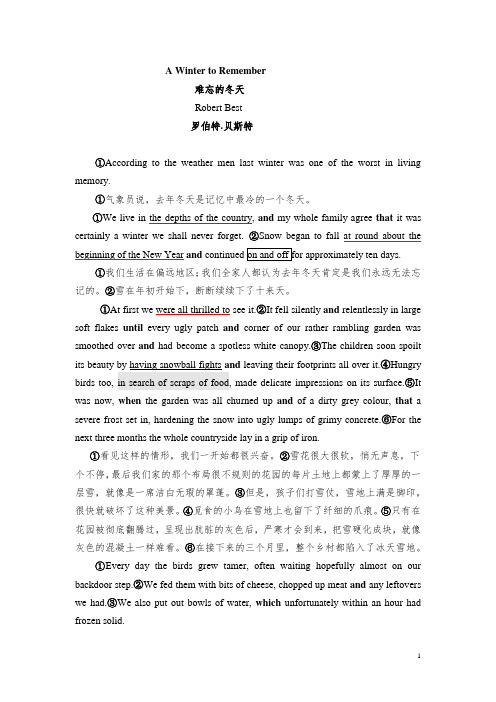
A Winter to Remember难忘的冬天Robert Best罗伯特.贝斯特①According to the weather men last winter was one of the worst in living memory.①气象员说,去年冬天是记忆中最冷的一个冬天。
①We live in the depths of the country, and my whole family agree that it was certainly a winter we shall never forget. ②Snow began to fall at round about thebeginning of the New Year and①我们生活在偏远地区;我们全家人都认为去年冬天肯定是我们永远无法忘记的。
②雪在年初开始下,断断续续下了十来天。
①At first we were all thrilled to see it.②It fell silently and relentlessly in large soft flakes until every ugly patch and corner of our rather rambling garden was smoothed over and had become a spotless white canopy.③The children soon spoiltleaving their footprints all over it.④Hungryon its surface.⑤It was now, when the garden was all churned up and of a dirty grey colour, that a severe frost set in, hardening the snow into ugly lumps of grimy concrete.⑥For the next three months the whole countryside lay in a grip of iron.①看见这样的情形,我们一开始都很兴奋。
新编大学英语综合教程3课文翻译
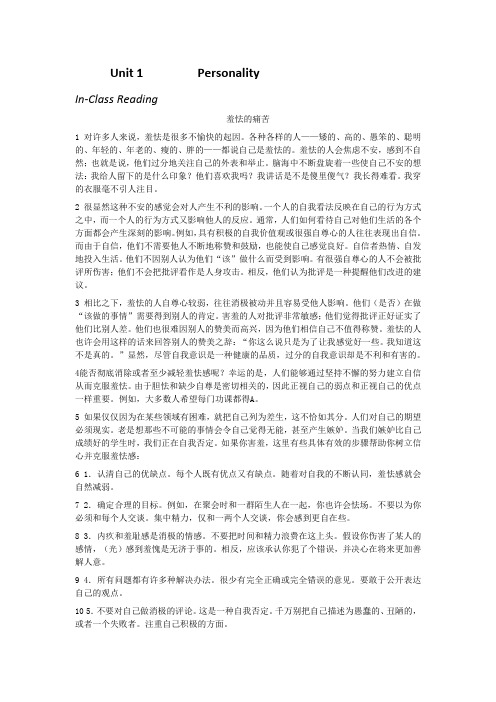
Unit 1 PersonalityIn-Class Reading羞怯的痛苦1 对许多人来说,羞怯是很多不愉快的起因。
各种各样的人——矮的、高的、愚笨的、聪明的、年轻的、年老的、瘦的、胖的——都说自己是羞怯的。
羞怯的人会焦虑不安,感到不自然;也就是说,他们过分地关注自己的外表和举止。
脑海中不断盘旋着一些使自己不安的想法:我给人留下的是什么印象?他们喜欢我吗?我讲话是不是傻里傻气?我长得难看。
我穿的衣服毫不引人注目。
2 很显然这种不安的感觉会对人产生不利的影响。
一个人的自我看法反映在自己的行为方式之中,而一个人的行为方式又影响他人的反应。
通常,人们如何看待自己对他们生活的各个方面都会产生深刻的影响。
例如,具有积极的自我价值观或很强自尊心的人往往表现出自信。
而由于自信,他们不需要他人不断地称赞和鼓励,也能使自己感觉良好。
自信者热情、自发地投入生活。
他们不因别人认为他们“该”做什么而受到影响。
有很强自尊心的人不会被批评所伤害;他们不会把批评看作是人身攻击。
相反,他们认为批评是一种提醒他们改进的建议。
3 相比之下,羞怯的人自尊心较弱,往往消极被动并且容易受他人影响。
他们(是否)在做“该做的事情”需要得到别人的肯定。
害羞的人对批评非常敏感;他们觉得批评正好证实了他们比别人差。
他们也很难因别人的赞美而高兴,因为他们相信自己不值得称赞。
羞怯的人也许会用这样的话来回答别人的赞美之辞:“你这么说只是为了让我感觉好一些。
我知道这不是真的。
”显然,尽管自我意识是一种健康的品质,过分的自我意识却是不利和有害的。
4能否彻底消除或者至少减轻羞怯感呢?幸运的是,人们能够通过坚持不懈的努力建立自信从而克服羞怯。
由于胆怯和缺少自尊是密切相关的,因此正视自己的弱点和正视自己的优点一样重要。
例如,大多数人希望每门功课都得A。
5 如果仅仅因为在某些领域有困难,就把自己列为差生,这不恰如其分。
人们对自己的期望必须现实。
老是想那些不可能的事情会令自己觉得无能,甚至产生嫉妒。
新标准大学英语3课文翻译
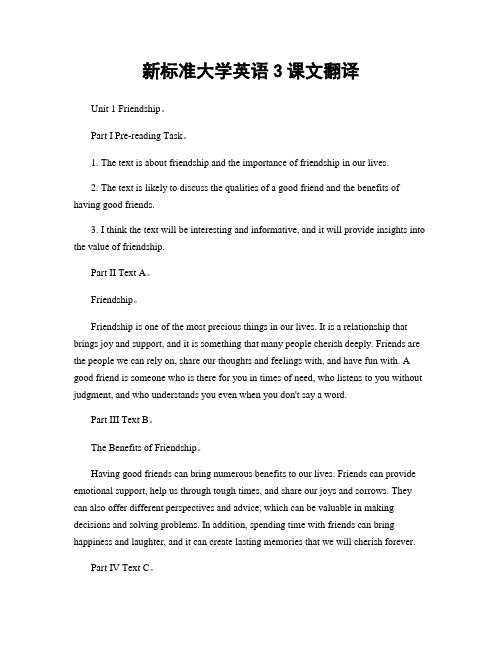
新标准大学英语3课文翻译Unit 1 Friendship。
Part I Pre-reading Task。
1. The text is about friendship and the importance of friendship in our lives.2. The text is likely to discuss the qualities of a good friend and the benefits of having good friends.3. I think the text will be interesting and informative, and it will provide insights into the value of friendship.Part II Text A。
Friendship。
Friendship is one of the most precious things in our lives. It is a relationship that brings joy and support, and it is something that many people cherish deeply. Friends are the people we can rely on, share our thoughts and feelings with, and have fun with. A good friend is someone who is there for you in times of need, who listens to you without judgment, and who understands you even when you don't say a word.Part III Text B。
新编大学英语第三册Unit5-10课文翻译
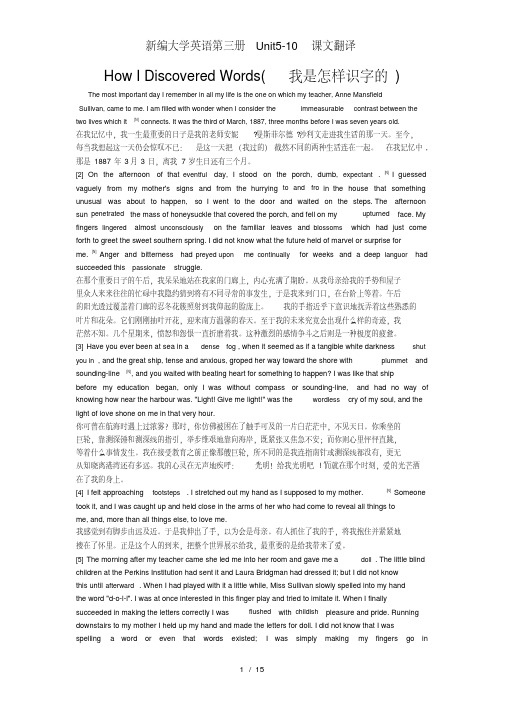
How I Discovered Words(我是怎样识字的) The most important day I remember in all my life is the one on which my teacher, Anne MansfieldSullivan, came to me. I am filled with wonder when I consider the immeasurable contrast between the two lives which it [N] connects. It was the third of March, 1887, three months before I was seven years old.在我记忆中,我一生最重要的日子是我的老师安妮?曼斯菲尔德?沙利文走进我生活的那一天。
至今,每当我想起这一天仍会惊叹不已:是这一天把(我过的)截然不同的两种生活连在一起。
在我记忆中, 那是1887年3月3日,离我7岁生日还有三个月。
[2] On the afternoon of that eventful day, I stood on the porch, dumb, expectant.[N] I guessed vaguely from my mother's signs and from the hurrying to and fro in the house that something unusual was about to happen, so I went to the door and waited on the steps. The afternoon sun penetrated the mass of honeysuckle that covered the porch, and fell on my upturned face. My fingers lingered almost unconsciously on the familiar leaves and blossoms which had just come forth to greet the sweet southern spring. I did not know what the future held of marvel or surprise forme.[N] Anger and bitterness had preyed upon me continually for weeks and a deep languor had succeeded this passionate struggle.在那个重要日子的午后,我呆呆地站在我家的门廊上,内心充满了期盼。
新编大学英语3的课文翻译
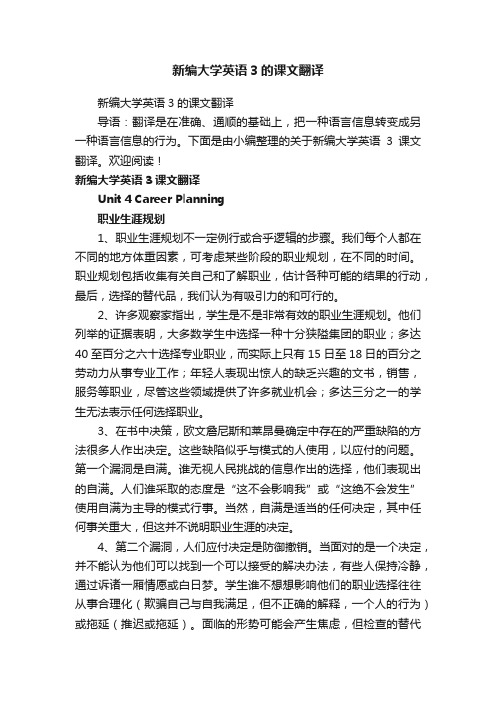
新编大学英语3的课文翻译新编大学英语3的课文翻译导语:翻译是在准确、通顺的基础上,把一种语言信息转变成另一种语言信息的行为。
下面是由小编整理的关于新编大学英语3课文翻译。
欢迎阅读!新编大学英语3课文翻译Unit 4 Career Planning职业生涯规划1、职业生涯规划不一定例行或合乎逻辑的步骤。
我们每个人都在不同的地方体重因素,可考虑某些阶段的职业规划,在不同的时间。
职业规划包括收集有关自己和了解职业,估计各种可能的结果的行动,最后,选择的替代品,我们认为有吸引力的和可行的。
2、许多观察家指出,学生是不是非常有效的职业生涯规划。
他们列举的证据表明,大多数学生中选择一种十分狭隘集团的职业;多达40至百分之六十选择专业职业,而实际上只有15日至18日的百分之劳动力从事专业工作;年轻人表现出惊人的缺乏兴趣的文书,销售,服务等职业,尽管这些领域提供了许多就业机会;多达三分之一的学生无法表示任何选择职业。
3、在书中决策,欧文詹尼斯和莱昂曼确定中存在的严重缺陷的方法很多人作出决定。
这些缺陷似乎与模式的人使用,以应付的问题。
第一个漏洞是自满。
谁无视人民挑战的信息作出的选择,他们表现出的自满。
人们谁采取的态度是“这不会影响我”或“这绝不会发生”使用自满为主导的模式行事。
当然,自满是适当的任何决定,其中任何事关重大,但这并不说明职业生涯的决定。
4、第二个漏洞,人们应付决定是防御撤销。
当面对的是一个决定,并不能认为他们可以找到一个可以接受的解决办法,有些人保持冷静,通过诉诸一厢情愿或白日梦。
学生谁不想想影响他们的职业选择往往从事合理化(欺骗自己与自我满足,但不正确的解释,一个人的行为)或拖延(推迟或拖延)。
面临的形势可能会产生焦虑,但检查的替代品也可提供救济。
5、第三个漏洞是hypervigilance 。
这发生在职业生涯决策当人们认为,没有足够的时间来寻找解决办法,他们的恐慌。
他们疯狂地寻找职业的可能性和抓住匆忙发明的解决办法,忽略了他们所选择的后果以及其他替代方案。
新编大学英语3课文翻译 Unit 5、6、 8、9,课后翻译

新编大学英语3课文翻译 Unit 5、6、 8、9第五单元,我是怎样识字的3 你可曾在航海时遇上过有浓雾的时候?你仿佛被困在了触手可及的一片白茫茫中,不见天日。
你乘坐的巨轮,靠测深锤或测深线的指引,举步维艰地靠向海岸,既紧张又焦急不安;而你则心里砰砰直跳,等着有事要发生。
而我在接受教育之前正像那巨轮,所不同的是我连指南针或测深线都没有,更无从知晓离港湾还有多远。
我的心灵在无声地疾呼:“光明!给我光明吧! ”而就在此时此刻,爱的光芒洒在了我的身上。
(考原课文填空,英文,注意新单词) 9 那天我学会了很多新词。
现在我已记不清都是些什么词了,但我还记得其中有“妈妈、爸爸、姐妹、老师”。
这些词使得整个世界就像有了“亚伦的神杖,充满了鲜花”,为我绽开。
在这个重要的日子快要结束时,已很难找到一个比我更加幸福的孩子。
我躺在自己的小床上,回味着这一天所给予我的欣喜;渴望着新的一天的到来,这是我有生以来从未有过的期盼。
(考课文英翻汉)第六单元,人和动物的好斗性1 人类肯定是所有动物中最好斗和最残忍的。
我们会说暴徒的行为就“像野兽”,然而事实上,没有任何一种动物象人类那样残暴。
当领域性的动物或鸟类侵入了别的同类动物的领地时,后者只会做一些表示敌意的姿态以吓跑入侵者。
但是,万一有争斗,任何一方都不会受重伤,因为败方会做出姿态表示投降以便保全性命。
一般情况下,动物之间只会为了觅食而杀戮,同类动物之间自相残杀是极少见的。
(考课文英翻汉)2 然而,如果动物发现自己处于异常环境下,它会表现出特别地富有攻击性。
有一只老虎从丛林跑到村庄来,袭击了人,后来人们发现原来它的爪子受了伤,使它显然不能像平时那样去猎食。
假如不是因为受伤,这只虎毫无疑问还会呆在丛林里,并像往常那样去猎取食物。
关在动物园笼子里的动物,往往会比在野外时更加寻衅好斗。
比如说,关在笼子里的狮子一旦能自由自在地徜徉在非洲的大草原上,那么它会一直活力充沛,长途游弋,与家族同类一起追捕食物。
新编大学英语3的课文翻译

新编大学英语3的课文翻译新编大学英语3的课文翻译导语:翻译是在准确、通顺的基础上,把一种语言信息转变成另一种语言信息的行为。
下面是由小编整理的关于新编大学英语3课文翻译。
欢迎阅读!新编大学英语3课文翻译Unit 4 Career Planning职业生涯规划1、职业生涯规划不一定例行或合乎逻辑的步骤。
我们每个人都在不同的地方体重因素,可考虑某些阶段的职业规划,在不同的时间。
职业规划包括收集有关自己和了解职业,估计各种可能的结果的行动,最后,选择的替代品,我们认为有吸引力的和可行的。
2、许多观察家指出,学生是不是非常有效的职业生涯规划。
他们列举的证据表明,大多数学生中选择一种十分狭隘集团的职业;多达40至百分之六十选择专业职业,而实际上只有15日至18日的百分之劳动力从事专业工作;年轻人表现出惊人的缺乏兴趣的文书,销售,服务等职业,尽管这些领域提供了许多就业机会;多达三分之一的学生无法表示任何选择职业。
3、在书中决策,欧文詹尼斯和莱昂曼确定中存在的严重缺陷的方法很多人作出决定。
这些缺陷似乎与模式的人使用,以应付的问题。
第一个漏洞是自满。
谁无视人民挑战的信息作出的选择,他们表现出的自满。
人们谁采取的态度是“这不会影响我”或“这绝不会发生”使用自满为主导的模式行事。
当然,自满是适当的任何决定,其中任何事关重大,但这并不说明职业生涯的决定。
4、第二个漏洞,人们应付决定是防御撤销。
当面对的是一个决定,并不能认为他们可以找到一个可以接受的解决办法,有些人保持冷静,通过诉诸一厢情愿或白日梦。
学生谁不想想影响他们的职业选择往往从事合理化(欺骗自己与自我满足,但不正确的解释,一个人的行为)或拖延(推迟或拖延)。
面临的形势可能会产生焦虑,但检查的替代品也可提供救济。
5、第三个漏洞是hypervigilance 。
这发生在职业生涯决策当人们认为,没有足够的时间来寻找解决办法,他们的恐慌。
他们疯狂地寻找职业的可能性和抓住匆忙发明的解决办法,忽略了他们所选择的后果以及其他替代方案。
新编大学英语全文翻译第三册U5

我是怎样识字的海伦• 凯勒在我记忆中,我一生最重要的日子是我的老师安妮•曼斯菲尔德•沙利文走进我生活的那一天。
至今,每当我想起这一天仍会惊叹不已:是这一天把(我过的)截然不同的两种生活连在一起。
在我记忆中, 那是1887年3月3日,离我7岁生日还有三个月。
在那个重要日子的午后,我呆呆地站在我家的门廊上,内心充满了期盼。
从我母亲给我的手势和屋子里众人来来往往的忙碌中我隐约猜到将有不同寻常的事发生,于是我来到门口,在台阶上等着。
午后的阳光透过覆盖着门廊的忍冬花簇照射到我仰起的脸庞上。
我的手指近乎下意识地抚弄着这些熟悉的叶片和花朵。
它们刚刚抽叶开花,迎来南方温馨的春天。
至于我的未来究竟会出现什么样的奇迹,我茫然不知。
几个星期来,愤怒和怨恨一直折磨着我。
这种激烈的感情争斗之后则是一种极度的疲惫。
你可曾在航海时遇上过浓雾?那时,你仿佛被困在了触手可及的一片白茫茫中,不见天日。
你乘坐的巨轮,靠测深锤和测深线的指引,举步维艰地靠向海岸,既紧张又焦急不安;而你则心里怦怦直跳,等着什么事情发生。
我在接受教育之前正像那艘巨轮,所不同的是我连指南针或测深线都没有,更无从知晓离港湾还有多远。
我的心灵在无声地疾呼:“光明!给我光明吧!”而就在那个时刻,爱的光芒洒在了我的身上。
我感觉到有脚步由远及近。
于是我伸出了手,以为会是母亲。
有人抓住了我的手,将我抱住并紧紧地搂在了怀里。
正是这个人的到来,把整个世界展示给我,最重要的是给我带来了爱。
在老师来到我家的第二天上午,她把我带到她的房间,这娃娃是帕金斯学校的小盲童们送给我的礼物,劳拉•布里奇曼给娃娃穿上了衣服,不过这些是我在后来才知道的。
给了我一个玩具娃娃。
我玩了一小会儿之后,沙利文小姐慢慢地在我的手上拼出了“d-o-l-l”(玩偶娃娃)这个词。
我一下子便对这种手指游戏产生了兴趣,而且试着模仿它。
当我终于正确地拼出了这几个字母时,内心充满了孩子气的喜悦和自豪。
我跑到楼下找到母亲,伸手拼出了“玩偶娃娃”所含的字母。
Unit3SocialProblems新编大学英语第二版第三册课文翻译

Unit 3 Social ProblemsLatchkey Childre n —Kno ck, Kn ock. Is An ybody HomeIn the Un ited States the cost of liv ing has bee n steadily rising for the past few decades. Food prices, cloth ing costs, hous ing expe nses, and tuiti on fees are constantly getting higher and higher. Partly because of financial need, and partly because of career choices for pers onal fulfillme nt, mothers have bee n leavi ng the traditional role of full-time homemaker. Increasingly they have been taking salariedjobs outside the home.Maki ng such a sig ni fica nt role cha nge affects the en tire family, especially thechildren. Someconsequences are obvious. For example, dinnertime is at a later hour.The emotional impact, on the other hand, can be more subtle. Mothers leave home in the morning, feeling guilty because they will not be homewhen their children return from school. They suppress their guilt since they believe that their work will ben efit every one in the long run. The in come will en able the family to save for college tuition, take an extended vacation, buy a new car, and so on.The emotional impact on the children can be significant. It is quite commonfor childre n to feel hurt and rese ntful. After all, they are alone several hours, and they feel that their mothers should "be there" for them. They might need assistanee with their homework or want to share the day's activities. All too ofte n, however,the mothers arrive home exhausted and face the immediate task of preparing dinner. Their priority is making the evening meal for the family, not engaging in relaxed con versati on.Latchkey children range in age from six to thirteen. Ona daily basis they return from school and uniock the door to their homewith the key hanging around their necks. They are now on their own, alone, in quiet, empty rooms. For some youn gsters, it is a productive period of private time, while for others it is a frightening, Ionelyvoid. For reas ons of safety, many pare nts forbid their childre n to go out to playor to have visitors at home. The youn gsters, therefore, feel isolated.Latchkey childre n who were in terviewed reported diverse react ions. Some latchkey children said that being on their own for a few hours each day fostered, or stimulated, a sense of in depe ndence and resp on sibility. They felt loved and trusted, and this feeli ng en couraged them to be self-c on fide nt. Latchkey girls, byobserv ing how their mothers coped with the dema nds of a family and a job, learned the role model of a working mother. Some children stated that they used their unsupervised free time to perfect their athletic skills, such as playing basketball. Others read books or practiced a musical instrument. These children looked upon their free time after school as an opport unity for pers onal developme nt. It led to positive,productive, and valuable experie nces.Con versely, many latchkey childre n expressed much bitter ness, rese ntme nt, andan ger for being made to live in this fashi on. Many claimed that too much resp on sibility was placed on them at an early age; it was an overwhel ming burde n.They were little people who really wan ted to be protected, en couraged, and caredfor through atte nti on from their mothers. Comi ng home to an empty house was disappointing,Ionely, and often frightening. They felt abandoned by their mothers.After all, it seemed to them that most other children had "normal" families whose mothers were "aro un d," whereas their own mothers were n ever home. Many childre n turned on the televisi on for the whole after noon day after day, in order to diminish feeli ngs of isolati on; furthermore, the voices were comforti ng. Freque ntly, they would doze off.Because of either econo mic n ecessity or stro ng determ in ati on for pers onal fulfillme nt, or both, the phe nomenon of latchkey childre n is widespread in our society. Whatever the reason, it is a compelling situation with which families must cope. The question to ask is not whether or not mothers should work full-time. Givenv1.0可编辑可修改the reality of the situati on, the questio n to ask is: how can an optimum pla n be worked out to deal effectively with the situati on.It is advisable for all members of the family to express their feelings andconcerns about the in evitable cha nge can didly. These remarks should be discussedfully. Many factors must be take n in to con siderati on: the childre n's pers on alityand maturity, the amount of time the children will be alone, the safety of theneighborhood, accessibility of help in case of an emergency. Of supreme importaneeis the quality of the relati on ship betwee n pare nts and childre n. It is most importa nt that the childre n be secure in the kno wledge that they are loved. Feeli ng loved provides in valuable e moti onal stre ngth to cope successfully with almost anydifficulty that arises in life.挂钥匙的孩子一一笃、笃,家里有人吗在过去的几十年中,美国的生活费用一直在持续增长。
新编大学英语第三册课后答案课文翻译

Unit 1 PersonalityVocabulary (P16)1. 1) self-conscious 2) self-confidence 3) self-esteem 4) self-destructive 5) self-worth6) self-concept 7) Self-awareness 8) self-assurance/self-confidence2. 1)B 2)I 3)L 4)A 5)H 6)D 7)E 8)N 9)J 10)M 11)C 12)F 13)G 14)K3. 1) profound 2) jealousy 3) numerous 4) overweight 5) overcome 6) eventually 7) slim8) compliments 9) diminish 10) reassurance 11) detrimental 12) isolated 13) self-esteem 14) accented 4. 1) reflected 2) concerned/worried 3) profound effect/influence 4) viewed/regarded 5)sensitive6) respond/react 7)eliminated 8)overcome my fear 9) concentrate on 10) made no comment Translation (P17)1) You should spend a reasonable amount of time relaxing and exercising.2) In general children are healthier and better educated than ever before.3) When the right opportunity comes along, he’ll take it.4) Every day he sets aside some time to be with his family and enjoy life.5) I remember those dark streets and walking hand in hand with my father.6) He finally failed to live up to his parents’ expectations.7) In contrast, our use of oil has increased enormously.8) He succeeded in his efforts to overcome his fatal weakness.Part Four Writing and Translation (P46)2. Translation Practice1) It is believed that pessimism often leads to hopelessness, sickness and failure.2) Optimism, by contrast, can make you happy, healthy and successful.3) When you fail in something, profit from the failure as a learning experience.4) Think about your strengths and build up self-confidence in front of problems or difficulties.5) Don’t let negative thoughts hold you back.6) Everyone has experienced failures and disappointments, so don’t blame yourself too much.Unit 2 Myths and LegendsVocabulary (P62)1. 1) A. invitation B. invited C. inviting 2) A. prepare B. prepared C. preparation D. preparatory/preparation3) A. discoveries B. discoverers C. discovered4) A. approval B. approve C. approved D. approving E. disapprove5) A. eloquent B. eloquence C. eloquently6) A. faithful B. unfaithful/faithless C. faith d. faithfully7) A. occasional B. occasionally C. occasion8) A. delivery B. delivering C. delivered9) A. troublesome B. troubled C. troubled D. troubling10) A. assurance B. assured C. assure2. 1) got/ran into trouble 2) no trouble 3) asking for trouble 4) have … trouble 5) trouble with 6) in serious/deep/big trouble 7) get/getting … into trouble 8) took the trouble3. 1) with a pattern of roses 2) prepared a wonderful/goof meal for us3) promised faithfully 4) deliver this letter5) a selection of milk and plain chocolate 6) keep out of mischief/behave themselves7) the sound of distant thunder 8) received approval from the government9) in spite of the fact that he drank too much 10) agree whether the drug is safe or notPart Three Further Development5. Complete the following Ancient Chinese story by translating the Chinese into English(P93)1) the true reason why there was no such animal in Guizhou2) they were of no use at all in this place3) when he saw the donkey all of a sudden, he thought it was a monster4) he hid himself in the trees while looking at the donkey5) what kind of animal is this and why does it look different from other animals that I’ve seen?6) But one day the donkey stretched its thin neck and cried7) the tiger discovered that the donkey didn’t have any other skills besides crying8) But he dared not rush to it and eat it just as he did to other animals9) This did irritate the donkey (made the donkey angry), who raised its hind leg and kicked the tiger10) This time he rushed to it without hesitation and bit its rhroatPart Four Writing and Translation2. Translation Practice(P96)万物之初,天地还是一体,充满混沌。
新编大学英语第三册第三版第一单元课文翻译及课后练习答案
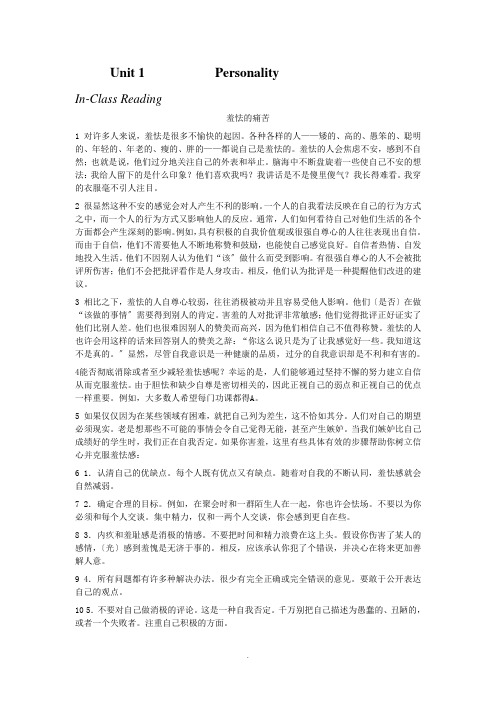
Unit 1 PersonalityIn-Class Reading羞怯的痛苦1 对许多人来说,羞怯是很多不愉快的起因。
各种各样的人——矮的、高的、愚笨的、聪明的、年轻的、年老的、瘦的、胖的——都说自己是羞怯的。
羞怯的人会焦虑不安,感到不自然;也就是说,他们过分地关注自己的外表和举止。
脑海中不断盘旋着一些使自己不安的想法:我给人留下的是什么印象?他们喜欢我吗?我讲话是不是傻里傻气?我长得难看。
我穿的衣服毫不引人注目。
2 很显然这种不安的感觉会对人产生不利的影响。
一个人的自我看法反映在自己的行为方式之中,而一个人的行为方式又影响他人的反应。
通常,人们如何看待自己对他们生活的各个方面都会产生深刻的影响。
例如,具有积极的自我价值观或很强自尊心的人往往表现出自信。
而由于自信,他们不需要他人不断地称赞和鼓励,也能使自己感觉良好。
自信者热情、自发地投入生活。
他们不因别人认为他们“该〞做什么而受到影响。
有很强自尊心的人不会被批评所伤害;他们不会把批评看作是人身攻击。
相反,他们认为批评是一种提醒他们改进的建议。
3 相比之下,羞怯的人自尊心较弱,往往消极被动并且容易受他人影响。
他们〔是否〕在做“该做的事情〞需要得到别人的肯定。
害羞的人对批评非常敏感;他们觉得批评正好证实了他们比别人差。
他们也很难因别人的赞美而高兴,因为他们相信自己不值得称赞。
羞怯的人也许会用这样的话来回答别人的赞美之辞:“你这么说只是为了让我感觉好一些。
我知道这不是真的。
〞显然,尽管自我意识是一种健康的品质,过分的自我意识却是不利和有害的。
4能否彻底消除或者至少减轻羞怯感呢?幸运的是,人们能够通过坚持不懈的努力建立自信从而克服羞怯。
由于胆怯和缺少自尊是密切相关的,因此正视自己的弱点和正视自己的优点一样重要。
例如,大多数人希望每门功课都得A。
5 如果仅仅因为在某些领域有困难,就把自己列为差生,这不恰如其分。
人们对自己的期望必须现实。
老是想那些不可能的事情会令自己觉得无能,甚至产生嫉妒。
新编大学英语第三版第三册Unit1课文翻译及课后练习答案

Unit 1 PersonalityIn-Class Reading羞怯的痛苦1 对许多人来说,羞怯是很多不愉快的起因。
各种各样的人——矮的、高的、愚笨的、聪明的、年轻的、年老的、瘦的、胖的——都说自己是羞怯的。
羞怯的人会焦虑不安,感到不自然;也就是说,他们过分地关注自己的外表和举止。
脑海中不断盘旋着一些使自己不安的想法:我给人留下的是什么印象?他们喜欢我吗?我讲话是不是傻里傻气?我长得难看。
我穿的衣服毫不引人注目。
2 很显然这种不安的感觉会对人产生不利的影响。
一个人的自我看法反映在自己的行为方式之中,而一个人的行为方式又影响他人的反应。
通常,人们如何看待自己对他们生活的各个方面都会产生深刻的影响。
例如,具有积极的自我价值观或很强自尊心的人往往表现出自信。
而由于自信,他们不需要他人不断地称赞和鼓励,也能使自己感觉良好。
自信者热情、自发地投入生活。
他们不因别人认为他们“该”做什么而受到影响。
有很强自尊心的人不会被批评所伤害;他们不会把批评看作是人身攻击。
相反,他们认为批评是一种提醒他们改进的建议。
3 相比之下,羞怯的人自尊心较弱,往往消极被动并且容易受他人影响。
他们(是否)在做“该做的事情”需要得到别人的肯定。
害羞的人对批评非常敏感;他们觉得批评正好证实了他们比别人差。
他们也很难因别人的赞美而高兴,因为他们相信自己不值得称赞。
羞怯的人也许会用这样的话来回答别人的赞美之辞:“你这么说只是为了让我感觉好一些。
我知道这不是真的。
”显然,尽管自我意识是一种健康的品质,过分的自我意识却是不利和有害的。
4能否彻底消除或者至少减轻羞怯感呢?幸运的是,人们能够通过坚持不懈的努力建立自信从而克服羞怯。
由于胆怯和缺少自尊是密切相关的,因此正视自己的弱点和正视自己的优点一样重要。
例如,大多数人希望每门功课都得A。
5 如果仅仅因为在某些领域有困难,就把自己列为差生,这不恰如其分。
人们对自己的期望必须现实。
老是想那些不可能的事情会令自己觉得无能,甚至产生嫉妒。
新编大学英语三afterclassreading课文翻译unit1--8
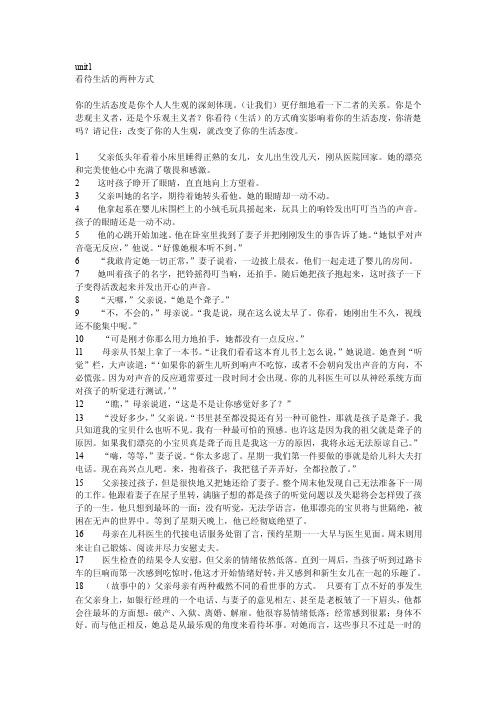
unit1看待生活的两种方式你的生活态度是你个人人生观的深刻体现。
(让我们)更仔细地看一下二者的关系。
你是个悲观主义者,还是个乐观主义者?你看待(生活)的方式确实影响着你的生活态度,你清楚吗?请记住:改变了你的人生观,就改变了你的生活态度。
1 父亲低头年看着小床里睡得正熟的女儿,女儿出生没几天,刚从医院回家。
她的漂亮和完美使他心中充满了敬畏和感激。
2 这时孩子睁开了眼睛,直直地向上方望着。
3 父亲叫她的名字,期待着她转头看他。
她的眼睛却一动不动。
4 他拿起系在婴儿床围栏上的小绒毛玩具摇起来,玩具上的响铃发出叮叮当当的声音。
孩子的眼睛还是一动不动。
5 他的心跳开始加速。
他在卧室里找到了妻子并把刚刚发生的事告诉了她。
“她似乎对声音毫无反应,”他说。
“好像她根本听不到。
”6 “我敢肯定她一切正常,”妻子说着,一边披上晨衣。
他们一起走进了婴儿的房间。
7 她叫着孩子的名字,把铃摇得叮当响,还拍手。
随后她把孩子抱起来,这时孩子一下子变得活泼起来并发出开心的声音。
8 “天哪,”父亲说,“她是个聋子。
”9 “不,不会的,”母亲说。
“我是说,现在这么说太早了。
你看,她刚出生不久,视线还不能集中呢。
”10 “可是刚才你那么用力地拍手,她都没有一点反应。
”11 母亲从书架上拿了一本书。
“让我们看看这本育儿书上怎么说,”她说道。
她查到“听觉”栏,大声读道:“‘如果你的新生儿听到响声不吃惊,或者不会朝向发出声音的方向,不必慌张。
因为对声音的反应通常要过一段时间才会出现。
你的儿科医生可以从神经系统方面对孩子的听觉进行测试。
’”12 “瞧,”母亲说道,“这是不是让你感觉好多了?”13 “没好多少,”父亲说。
“书里甚至都没提还有另一种可能性,那就是孩子是聋子。
我只知道我的宝贝什么也听不见。
我有一种最可怕的预感。
也许这是因为我的祖父就是聋子的原因。
如果我们漂亮的小宝贝真是聋子而且是我这一方的原因,我将永远无法原谅自己。
”14 “嗨,等等,”妻子说。
新编大学英语第三册第三版第一单元课文翻译及课后练习答案
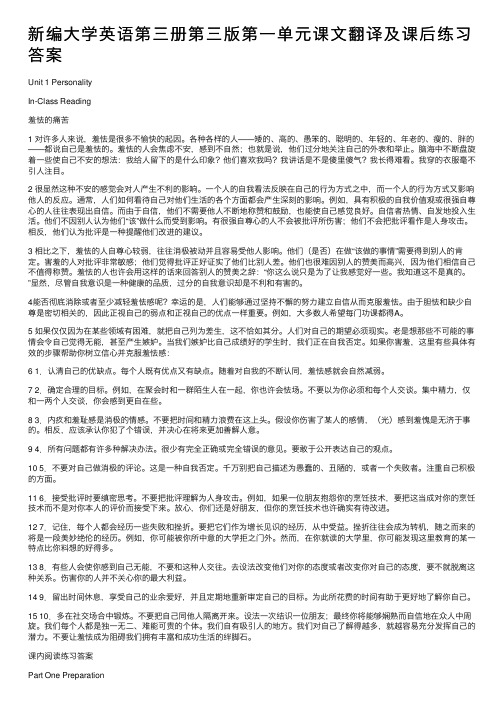
新编⼤学英语第三册第三版第⼀单元课⽂翻译及课后练习答案Unit 1 PersonalityIn-Class Reading羞怯的痛苦1 对许多⼈来说,羞怯是很多不愉快的起因。
各种各样的⼈——矮的、⾼的、愚笨的、聪明的、年轻的、年⽼的、瘦的、胖的——都说⾃⼰是羞怯的。
羞怯的⼈会焦虑不安,感到不⾃然;也就是说,他们过分地关注⾃⼰的外表和举⽌。
脑海中不断盘旋着⼀些使⾃⼰不安的想法:我给⼈留下的是什么印象?他们喜欢我吗?我讲话是不是傻⾥傻⽓?我长得难看。
我穿的⾐服毫不引⼈注⽬。
2 很显然这种不安的感觉会对⼈产⽣不利的影响。
⼀个⼈的⾃我看法反映在⾃⼰的⾏为⽅式之中,⽽⼀个⼈的⾏为⽅式⼜影响他⼈的反应。
通常,⼈们如何看待⾃⼰对他们⽣活的各个⽅⾯都会产⽣深刻的影响。
例如,具有积极的⾃我价值观或很强⾃尊⼼的⼈往往表现出⾃信。
⽽由于⾃信,他们不需要他⼈不断地称赞和⿎励,也能使⾃⼰感觉良好。
⾃信者热情、⾃发地投⼊⽣活。
他们不因别⼈认为他们“该”做什么⽽受到影响。
有很强⾃尊⼼的⼈不会被批评所伤害;他们不会把批评看作是⼈⾝攻击。
相反,他们认为批评是⼀种提醒他们改进的建议。
3 相⽐之下,羞怯的⼈⾃尊⼼较弱,往往消极被动并且容易受他⼈影响。
他们(是否)在做“该做的事情”需要得到别⼈的肯定。
害羞的⼈对批评⾮常敏感;他们觉得批评正好证实了他们⽐别⼈差。
他们也很难因别⼈的赞美⽽⾼兴,因为他们相信⾃⼰不值得称赞。
羞怯的⼈也许会⽤这样的话来回答别⼈的赞美之辞:“你这么说只是为了让我感觉好⼀些。
我知道这不是真的。
”显然,尽管⾃我意识是⼀种健康的品质,过分的⾃我意识却是不利和有害的。
4能否彻底消除或者⾄少减轻羞怯感呢?幸运的是,⼈们能够通过坚持不懈的努⼒建⽴⾃信从⽽克服羞怯。
由于胆怯和缺少⾃尊是密切相关的,因此正视⾃⼰的弱点和正视⾃⼰的优点⼀样重要。
例如,⼤多数⼈希望每门功课都得A。
5 如果仅仅因为在某些领域有困难,就把⾃⼰列为差⽣,这不恰如其分。
Unit-3-Social-Problems新编大学英语第二版第三册课文翻译
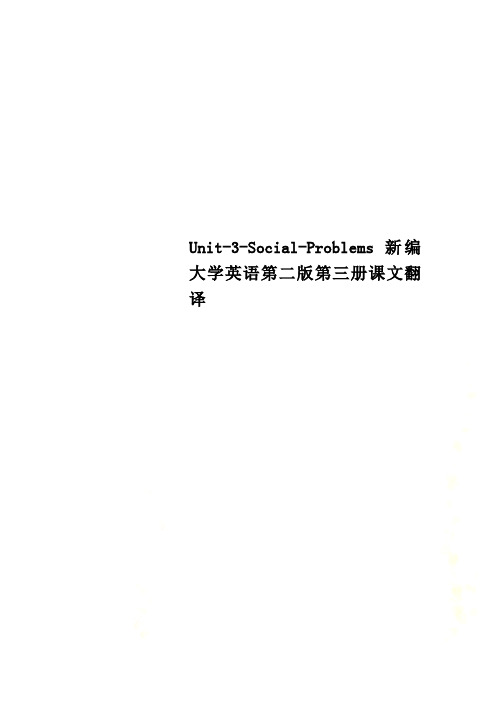
Unit-3-Social-Problems新编大学英语第二版第三册课文翻译Unit 3 Social ProblemsLatchkey Children—Knock, Knock, IsAnybody Home?In the United States the cost of living has been steadily rising for the past few decades. Food prices, clothing costs, housing expenses, and tuition fees are constantly getting higher and higher. Partly because of financial need, and partly because of career choices for personal fulfillment, mothers have been leaving the traditional role of full-time homemaker. Increasingly they have been taking salaried jobs outside the home.Making such a significant role change affects the entire family, especially the children. Some consequences are obvious. For example, dinnertime is at a later hour. The emotional impact, on the other hand,can be more subtle. Mothers leave home in the morning, feeling guilty because they will not be home when their children return from school. They suppress their guilt since they believe that their work will benefit everyone in the long run. The income will enable the family to save for college tuition, take an extended vacation, buy a new car, and so on.The emotional impact on the children can be significant. It is quite common for children to feel hurt and resentful. After all, they are alone several hours, and they feel that their mothers should "be there" for them. They might need assistance with their homework or want to share the day's activities. All too often, however, the mothers arrive home exhausted and face the immediate task of preparing dinner. Their priority is making theencouraged them to be self-confident. Latchkey girls, by observing how their mothers coped with the demands of a family and a job, learned the role model of a working mother. Some children stated that they used their unsupervised free time to perfect their athletic skills, such as playing basketball. Others read books or practiced a musical instrument. These children looked upon their free time after school as an opportunity for personal development. It led to positive, productive, and valuable experiences.Conversely, many latchkey children expressed much bitterness, resentment, and anger for being made to live in this fashion. Many claimed that too much responsibility was placed on them at an early age; it was an overwhelming burden. They were little people whoreally wanted to be protected, encouraged, and cared for through attention from their mothers. Coming home to an empty house was disappointing, lonely, and often frightening. They felt abandoned by their mothers. After all, it seemed to them that most other children had "normal" families whose mothers were "around," whereas their own mothers were never home. Many children turned on the television for the whole afternoon day after day, in order to diminish feelings of isolation; furthermore, the voices were comforting. Frequently, they would doze off.Because of either economic necessity or strong determination for personal fulfillment, or both, the phenomenon of latchkey children is widespread in our society. Whatever thereason, it is a compelling situation with which families must cope. The question to ask is not whether or not mothers should work full-time. Given the reality of the situation, the question to ask is: how can an optimum plan be worked out to deal effectively with the situation.It is advisable for all members of the family to express their feelings and concerns about the inevitable change candidly. These remarks should be discussed fully. Many factors must be taken into consideration: the children's personality and maturity, the amount of time the children will be alone, the safety of the neighborhood, accessibility of help in case of an emergency. Of supreme importance is the quality of the relationship between parents and children. It is most important that the children be secure in the knowledge that they are loved. Feeling lovedprovides invaluable emotional strength to cope successfully with almost any difficulty that arises in life.挂钥匙的孩子——笃、笃,家里有人吗?在过去的几十年中,美国的生活费用一直在持续增长。
- 1、下载文档前请自行甄别文档内容的完整性,平台不提供额外的编辑、内容补充、找答案等附加服务。
- 2、"仅部分预览"的文档,不可在线预览部分如存在完整性等问题,可反馈申请退款(可完整预览的文档不适用该条件!)。
- 3、如文档侵犯您的权益,请联系客服反馈,我们会尽快为您处理(人工客服工作时间:9:00-18:30)。
职业生涯规划
1职业生涯规划不一定例行或合乎逻辑的步骤。我们每个人都在不同的地方体重因素,可考虑某些阶段的职业规划,在不同的时间。职业规划包括收集有关自己和了解职业,估计各种可能的结果的行动,最后,选择的替代品,我们认为有吸引力的和可行的。
2许多观察家指出,学生是不是非常有效的职业生涯规划。他们列举的证据表明,大多数学生中选择一种十分狭隘集团的职业;多达40至百分之六十选择专业职业,而实际上只有15日至18日的百分之劳动力从事专业工作;年轻人表现出惊人的缺乏兴趣的文书,销售,服务等职业,尽管这些领域提供了许多就业机会;多达三分之一的学生无法表示任何选择职业。
13个职位的变化和职业的变化发生在所有年龄层。据估计,多达四分之一的男性工人年龄介于20和2005年改变其工作方针。大约有一半的数量这样做岁之间的25和44 。
14职业生涯规划并不能保证所有的问题,困难,或决策的情况,面对您在不久的将来得到解决或取得任何方便。没有任何公式可以考虑这样做。但是,职业规划应该帮助你的办法,更好地应对新问题,如决定是否进入教育或培训计划,决定是否更换工作,并分析了困难,您有一个或一个人的情况。
5钥匙儿童谁采访报道不同的反应。一些钥匙儿童说,正在自己的几个小时,每天培养,或刺激,意识的独立性和责任。他们认为爱和信任,这种感觉鼓励他们自信。钥匙女孩,通过观察他们的母亲应付需求的家庭和工作,学习的榜样,一个工作的母亲。有的孩子说,他们利用他们的空闲时间无人监管,完善他们的运动技能,如打篮球。其他看书或练乐器。这些孩子看待他们的自由时间放学后的个人发展机会。它导致积极的,富有成效的,和宝贵的经验。
7以下是关键的职业规划。
8 。研究自己。这是关键的职业规划。了解你喜欢,你的价值,以及你想成为的基础是所有职业规划。在学习,你检查你的长处和短处,自己的目标,以及您个人的趋势发展。自我的理解是,您可以获得您可以想像某些职业可能最适合你的个性,兴趣,能力和目标。所有职业的决定,要求我们既要了解自己,了解有关工作,并结合这两种知识。
3情绪影响的儿童可能会很大。这是很常见的儿童感到伤害和怨恨。毕竟,他们仅仅几个小时,他们觉得,他们的母亲“应该有”他们。他们可能需要协助他们的家庭作业或想分享当天的活动。常常,然而,到达家庭的母亲用尽,面对眼前的任务的准备晚餐。其重点是使晚餐的家庭,而不是从事轻松的交谈。
4钥匙儿童的年龄范围从6个增加到13个。每天都在他们返回学校和解锁门家园的关键挂在脖子。他们现在对自己的,独立,在安静的,空的房间。对于一些青少年,这是一个生产期间的私人时间,而另一些人是可怕的,寂寞是无效的。基于安全的理由,许多家长禁止孩子出去玩,或有旅客在家里。青少年,因此,感到孤单。
3在书中决策,欧文詹尼斯和莱昂曼确定中存在的严重缺陷的方法很多人作出决定。这些缺陷似乎与模式的人使用,以应付的问题。第一个漏洞是自满。谁无视人民挑战的信息作出的选择,他们表现出的自满。人们谁采取的态度是“这不会影响我”或“这绝不会发生”使用自满为主导的模式行事。当然,自满是适当的任何决定,其中任何事关重大,但这并不说明职业生涯的决定。
2制作这样一个重要的角色变化影响到整个家庭,尤其是儿童。一些后果是显而易见的。例如,晚餐是在稍后小时。情绪的影响,另一方面,可以更加微妙。母亲离家上午,感觉有罪,因为他们不会主页返回时,他们的孩子上学。他们压制他们有罪,因为他们相信,他们的工作将会造福于每个人的长期利益。收入将使家庭节省的大学学费,采取了延长假期,买一辆新车,等等。
9 。撰写您的职业目标了。有用的技术,组织观念的职业发展实际上是为写下来的时间在你的生活区块。写下来部队您结晶您的思想和认识不清,半形成的想法。这可能导致新的见解您的可能性和可帮助您查看新的关系,模式和趋势,或找出差距在你思考你的职业发展。
10 。修改您的计划和进度定期与他人。每个经常,评估您的情况,并考虑了哪些步骤将采取下一步。考虑库存的进展和规划进一步的步骤可以帮助您解决的变化,你的经历和变化,在劳动力市场。谈到自己的计划,高校辅导员,你的父母,和你的朋友可以帮助您确定您的目标和改善你的职业生涯规划或使他们的工作。
7由于任何经济上的需要,或为个人的坚定决心履行,或两者兼而有之,但这种现象的钥匙儿童是我们社会中普遍存在。不管什么原因,这是一个引人注目的情况,家庭必须应付。要问的问题不是是否应该母亲应全时工作。鉴于现实情况,这个问题问的是:如何以最佳的计划制定出有效地处理这种情况。
8这是可取的所有家庭成员,以表达自己的感情和关注,不可避免的改变坦率。这些言论应该充分讨论。许多因素必须考虑到:孩子们的个性和成熟,所需的时间将孩子单独,安全的社区,获得帮助,如遇紧急情况。最高法院重要的是质量的关系,父母与子女之间。最重要的是,儿童是安全的知识,他们的喜爱。爱的感觉提供了宝贵的精神力量,成功地对付几乎所有的困难,在生活中出现。( 760字)
15没有人可以预见的未来持有的任何我们。有社会,情感,和道义上的考虑我们对未来不可预见。但最重要的教训,这往往不愉快的是,现代世界的进展来自规划。不了解自己的职业生涯并不幸福“ 10 ” ;原因是优于机会和命运。虽然目前还没有确定的方法,使职业生涯规划工作,有些事情你现在能做的塑造你的职业生涯的可能性。( 1047字)
Unit 1 Personality羞怯的痛苦
对许多人来说,羞怯是很多不愉快的起因。各种各样的人——矮的、高的、愚笨的、聪明的、年轻的、年老的、瘦的、胖的——都说自己是羞怯的。羞怯的人会焦虑不安,感到不自然;也就是说,他们过分地关注自己的外表和举止。脑海中不断盘旋着一些使自己不安的想法:我给人留下的是什么印象?他们喜欢我吗?我讲话是不是傻里傻气?我长得难看。我穿的衣服毫不引人注目。很显然这种不安的感觉会对人产生不利的影响。一个人的自我看法反映在自己的行为方式之中,而一个人的行为方式又影响他人的反应。通常,人们如何看待自己对他们生活的各个方面都会产生深刻的影响。例如,具有积极的自我价值观或很强自尊心的人往往表现出自信。而由于自信,他们不需要他人不断地称赞和鼓励,也能使自己感觉良好。自信者热情、自发地投入生活。他们不因别人认为他们“该”做什么而受到影响。有很强自尊心的人不会被批评所伤害;他们不会把批评看作是人身攻击。相反,他们认为批评是一种提醒他们改进的建议。相比之下,羞怯的人自尊心较弱,往往消极被动并且容易受他人影响。他们(是否)在做“该做的事情”需要得到别人的肯定。害羞的人对批评非常敏感;他们觉得批评正好证实了他们比别人差。他们也很难因别人的赞美而高兴,因为他们相信自己不值得称赞。羞怯的人也许会用这样的话来回答别人的赞美之辞:“你这么说只是为了让我感觉好一些。我知道这不是真的。”显然,尽管自我意识是一种健康的品质,过分的自我意识却是不利和有害的。能否彻底消除或者至少减轻羞怯感呢?幸运的是,人们能够通过坚持不懈的努力建立自信从而克服羞怯。由于胆怯和缺少自尊是密切相关的,因此正视自己的弱点和正视自己的优点一样重要。例如,大多数人希望每门功课都得A。如果仅仅因为在某些领域有困难,就把自己列为差生,这不恰如其分。人们对自己的期望必须现实。老是想那些不可能的事情会令自己觉得无能,甚至产生嫉妒。当我们嫉妒比自己成绩好的学生时,我们正在自我否定。如果你害羞,这里有些具体有效的步骤帮助你树立信心并克服羞怯感:1.认清自己的优缺点。每个人既有优点又有缺点。随着对自我的不断认同,羞怯感就会自然减弱。2.确定合理的目标。例如,在聚会时和一群陌生人在一起,你也许会怯场。不要以为你必须和每个人交谈。集中精力,仅和一两个人交谈,你会感到更自在些。3情,(光)感到羞愧是无济于事的。相反,应该承认你犯了个错误,并决心在将来更加善解人意。4.所有问题都有许多种解决办法。很少有完全正确或完全错误的意见。要敢于公开表达自己的观点。5.不要对自己做消极的评论。这是一种自我否定。千万别把自己描述为愚蠢的、丑陋的,或者一个失败者。注重自己积极的方面。6.接受批评时要缜密思考。不要把批评理解为人身攻击。例如,如果一位朋友抱怨你的烹饪技术,要把这当成对你的烹饪技术而不是对你本人的评价而接受下来。放心,你们还是好朋友,但你的烹饪技术也许确实有待改进。7.记住,每个人都会经历一些失败和挫折。要把它们作为增长见识的经历,从中受益。挫折往往会成为转机,随之而来的将是一段美妙绝伦的经历。例如,你可能被你所中意的大学拒之门外。然而,在你就读的大学里,你可能发现这里教育的某一特点比你料想的好得多。8.有些人会使你感到自己无能,不要和这种人交往。去设法改变他们对你的态度或者改变你对自己的态度,要不就脱离这种关系。伤害你的人并不关心你的最大利益。9.留出时间休息,享受自己的业余爱好,并且定期地重新审定自己的目标。为此所花费的时间有助于更好地了解你自己。10.多在社交场合中锻炼。不要把自己同他人隔离开来。设法一次结识一位朋友;最终你将能够娴熟而自信地在众人中周旋。我们每个人都是独一无二、难能可贵的个体。我们自有吸引人的地方。我们对自己了解得越多,就越容易充分发挥自己的潜力。不要让羞怯成为阻碍我们拥有丰富和成功生活的绊脚石。
4第二个漏洞,人们应付决定是防御撤销。当面对的是一个决定,并不能认为他们可以找到一个可以接受的解决办法,有些人保持冷静,通过诉诸一厢情愿或白日梦。学生谁不想想影响他们的职业选择往往从事合理化(欺骗自己与自我满足,但不正确的解释,一个人的行为)或拖延(推迟或拖延)。面临的形势可能会产生焦虑,但检查的替代品也可提供救济。
5第三个漏洞是hypervigilance 。这发生在职业生涯决策当人们认为,没有足够的时间来寻找解决办法,他们的恐慌。他们疯狂地寻找职业的可能性和抓住匆忙发明的解决办法,忽略了他们所选择的后果以及其他替代方案。人谁在恐慌有时并不认为明确或逻辑。
6最好的因应行为是警惕。警惕决策时,就会发生人认为,选择,应作出,他们可以找到一个解决办法,并且有足够的时间。在这种情况下,学生可以进行有效的寻找替代的职业,认真评估每一个备选方案,并制定应急计划,以防一种或另一种风险出现。
6另一方面,许多钥匙儿童表示非常痛苦,怨恨和愤怒的正生活在这种方式。许多人声称,鉴于太多的责任是对他们在幼年;这是一个压倒性的负担。他们是谁没有人真的很想得到保护,鼓励和关怀,通过注意从他们的母亲。回家的空房子,令人失望,孤独,而且往往是可怕的。他们认为他们的母亲所抛弃。毕竟,它似乎他们大多数其他儿童的“正常”的家庭,其母亲“周围” ,而自己的母亲从来没有回家。许多儿童开启电视的整个下午一天,以减少感情隔离;此外,声音安慰。通常情况下,他们会打瞌睡。
